
Applied Animal Science
Scope & Guideline
Innovating Solutions for Animal Well-being and Food Safety
Introduction
Aims and Scopes
- Animal Nutrition and Diet Formulation:
Research on the nutritional requirements of livestock, including the evaluation of feed ingredients, dietary supplements, and the effects of different feeding strategies on animal performance and health. - Animal Health and Disease Management:
Studies investigating the prevention, diagnosis, and treatment of diseases affecting livestock, including the use of antibiotics, vaccines, and management practices to improve animal health. - Production Systems and Management Practices:
Exploration of various production systems (e.g., pasture-based, feedlot) and management practices that optimize animal productivity, welfare, and economic viability. - Genetics and Breeding:
Research on genetic factors influencing animal performance, including studies on breeding strategies to enhance traits such as growth rate, feed efficiency, and disease resistance. - Sustainability and Environmental Impact:
Investigations into the sustainability of animal production systems, including the assessment of environmental impacts and the development of practices that reduce carbon footprints and enhance resource efficiency.
Trending and Emerging
- Precision Livestock Farming (PLF):
Research on the use of technology to monitor and manage livestock health and production in real-time is gaining traction, reflecting the increasing demand for data-driven management practices. - Alternative Protein Sources and Feed Additives:
There is a growing interest in the evaluation of non-traditional protein sources and feed additives that enhance animal performance while also addressing environmental sustainability. - Animal Welfare and Ethical Considerations:
Research focusing on the ethical treatment of animals and welfare implications of production practices is increasingly being prioritized, aligning with consumer concerns and societal expectations. - Sustainable Production Practices:
Studies examining the sustainability of animal production systems, including regenerative agriculture and carbon sequestration, are becoming more prominent as the industry seeks to mitigate its environmental impact. - Health and Nutrition Interactions:
Emerging research is increasingly focusing on the interactions between nutrition and health, particularly in how dietary strategies can enhance immune function and reduce disease prevalence.
Declining or Waning
- Traditional Antibiotic Use:
Research focused on the use of traditional antibiotics in livestock has decreased as the industry moves towards alternative health management strategies and a reduction in antibiotic usage due to regulatory pressures and consumer demand. - Simple Feed Ingredient Comparisons:
Studies that solely compare basic feed ingredients without considering their interactions in complex diets are becoming less common as researchers aim for more comprehensive evaluations of animal nutrition. - General Welfare Studies:
While animal welfare remains important, the focus has shifted from general assessments to more specific studies that link welfare directly to productivity, health outcomes, and consumer preferences. - Conventional Breeding Methods:
The exploration of conventional breeding methods is waning as advancements in genetic technologies, such as genomics and gene editing, become more prominent in the literature. - Basic Economic Analyses:
Basic economic analyses of livestock production are being replaced by more sophisticated models that integrate sustainability metrics and market dynamics.
Similar Journals
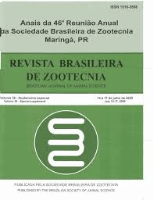
REVISTA BRASILEIRA DE ZOOTECNIA-BRAZILIAN JOURNAL OF ANIMAL SCIENCE
Leading the Charge in Animal Science ExcellenceREVISTA BRASILEIRA DE ZOOTECNIA - BRAZILIAN JOURNAL OF ANIMAL SCIENCE is a leading open-access journal published by the esteemed Universidade Federal Viçosa, dedicated to advancing the field of animal science and agricultural research in Brazil and beyond. With an ISSN of 1516-3598 and an E-ISSN of 1806-9290, the journal has been a crucial resource since its inception in 1996, now looking ahead to its continued contribution through 2024. As a Q3-ranked journal in Animal Science and Zoology, it provides a platform for high-quality research, encouraging the dissemination of cutting-edge studies and innovative methodologies. The journal's impact in the scientific community is further reflected in its Scopus ranking within the 46th percentile, evidencing its importance in the global discourse around animal science. For researchers, professionals, and students alike, REVISTA BRASILEIRA DE ZOOTECNIA offers a valuable opportunity to engage with timely, peer-reviewed content and contribute to the advancement of knowledge in animal sciences.

Scientific Papers-Series D-Animal Science
Transforming Insights into Practice in Animal SciencesScientific Papers-Series D-Animal Science is a prominent academic journal published by the University of Agronomic Sciences and Veterinary Medicine Bucharest (USAMV). With its ISSN number 2285-5750 and E-ISSN 2393-2260, this journal serves as a critical platform for the dissemination of innovative research in the field of animal science and veterinary medicine. The journal focuses on a broad range of topics, from animal breeding and nutrition to health and welfare, contributing significantly to the advancement of knowledge and practice within these vital areas. Although it currently does not offer open access, the journal maintains a commitment to high-quality research with the potential to influence policy and practice in animal sciences. Researchers, professionals, and students are encouraged to engage with the journal to enhance their understanding and contribute to ongoing discussions in this essential field. The journal's rich academic environment fosters collaboration and encourages submissions of original studies, reviews, and case reports that can shape the future of animal science.

ANIMAL SCIENCE PAPERS AND REPORTS
Unveiling the Future of Animal Biotechnology and ScienceANIMAL SCIENCE PAPERS AND REPORTS, published by the Polish Academy of Sciences, Institute of Genetics and Animal Biotechnology, is a distinguished platform for interdisciplinary research reflecting the evolving fields of Animal Science, Biotechnology, and Genetics. With an ISSN of 0860-4037 and an E-ISSN of 2300-8342, this journal serves as an essential resource for researchers and professionals aiming to advance their understanding and apply innovative methodologies in veterinary science and animal biotechnology. Despite being classified in Quartile 4 across several categories in 2023 and noting a notable country-based focus in Poland, it continues to provide valuable insights into animal genetics and biotechnological advancements, particularly as it converges its content from 2007 to 2024. While currently not an open access journal, ANIMAL SCIENCE PAPERS AND REPORTS is committed to upholding academic rigor, making it a key asset for students, researchers, and industry professionals looking to contribute to and stay informed in these vital scientific areas.
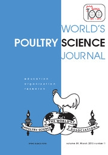
WORLDS POULTRY SCIENCE JOURNAL
Connecting scholars and industry experts in poultry advancements.Worlds Poultry Science Journal, published by Taylor & Francis Ltd, is a premier academic journal in the field of poultry science, recognized for its significant contributions to advancements in animal science and zoology. With an impressive impact factor and a 2023 ranking placing it in the Q1 category for both Agricultural and Biological Sciences, this journal is highly regarded among researchers and professionals. As an authoritative source for innovative research from 1945 to 2024, it serves as an essential platform for the dissemination of knowledge concerning poultry health, nutrition, genetics, and management strategies. While it currently does not offer open access, the journal caters to a global audience, fostering collaboration and advancing scientific understanding within the poultry industry. Located in the United Kingdom, Worlds Poultry Science Journal is positioned at the forefront of poultry research, making it an invaluable resource for students, scholars, and industry experts alike.
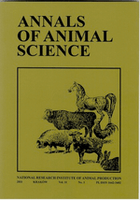
Annals of Animal Science
Connecting Professionals Through Open Access KnowledgeAnnals of Animal Science is a prestigious academic journal, published by Walter de Gruyter GmbH in Germany, specializing in the multifaceted field of Animal Science. With an ISSN of 1642-3402 and an E-ISSN of 2300-8733, this journal is recognized for its high-impact contributions, holding a commendable impact factor that demonstrates its relevance in nurturing quality research. The journal has garnered Q2 rankings in 2023 across various categories including Animal Science and Zoology, Food Animals, and Small Animals. Notably, its Scopus Rankings indicate an elite standing, with the journal placing in the top 10% within its specific fields. Covering converged years from 2008 to 2024, the Annals of Animal Science serves as an essential platform for researchers, professionals, and students to disseminate knowledge and advance studies related to animal health, welfare, and production. The journal also emphasizes open access, promoting broader accessibility to foster collaboration and innovation in Animal Science globally. For those committed to advancing their understanding of veterinary and agricultural sciences, this journal is a vital resource.
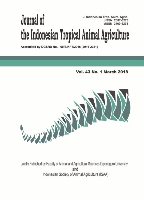
Journal of the Indonesian Tropical Animal Agriculture
Unlocking Solutions for Tropical Animal ChallengesJournal of the Indonesian Tropical Animal Agriculture is an esteemed peer-reviewed journal published by UNIV DIPONEGORO, focusing on the dynamic fields of animal science and veterinary medicine. Since its inception in 2009, the journal has maintained an open access policy, ensuring that valuable research is freely available to the global scientific community. Based in Indonesia, the journal has adapted to the evolving agricultural landscape and now contributes significantly to both local and international discourse on tropical animal husbandry. With a Scopus rank placing it within the 36th percentile for general veterinary sciences and the 25th percentile for animal science and zoology, it is emerging as a valuable resource for researchers and professionals alike. The journal covers a broad range of topics within its scope, fostering innovative approaches and solutions tailored to the unique challenges of the tropical environment. By exploring critical issues in animal agriculture, this journal not only enhances academic knowledge but also supports sustainable practices within the industry. We invite researchers, students, and professionals in the realm of veterinary science and animal agriculture to engage with the rich array of research presented in this journal.

Italian Journal of Animal Science
Fostering excellence in animal science scholarship.Italian Journal of Animal Science (ISSN: 1594-4077; E-ISSN: 1828-051X), published by Taylor & Francis Ltd, serves as a pivotal platform for the dissemination of cutting-edge research in the fields of animal science and zoology. Since its transition to Open Access in 2002, it has broadened its reach, allowing researchers from around the globe to share their findings and engage in critical dialogue. With its esteemed Q1 ranking in the 2023 category of Animal Science and Zoology and a notable position in the Scopus rankings—ranked 65 out of 490—this journal is a leader in driving the advancement of knowledge in animal science. The Italian Journal of Animal Science aims to publish original research articles, reviews, and methodological papers that contribute to the understanding of animal biology, welfare, nutrition, and conservation, making it a vital resource for researchers, professionals, and students dedicated to advancing the field. Based in the United Kingdom, and with a commitment to excellence, the journal is poised to continue fostering scholarly communication through 2024 and beyond.
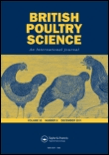
BRITISH POULTRY SCIENCE
Elevating poultry research to new heights.British Poultry Science, published by Taylor & Francis Ltd, is a leading journal dedicated to advancing research in the fields of poultry science, animal husbandry, and food production. With an impressive converged publication history since 1960, this journal serves as a valuable resource for researchers and professionals aiming to enhance the welfare, production, and sustainability of poultry industries worldwide. The journal holds a respectable Q2 ranking in Animal Science and Zoology, Food Science, and Medicine (miscellaneous) for 2023, placing it among the top quartiles of its field. With a Scopus Ranking of #102 out of 490 in Animal Science and Zoology, and a #161 rank in Food Science, it reflects a robust impact factor and relevance in enhancing academic discourse. Although it operates under a traditional subscription model, researchers and students are encouraged to explore the rich compilation of cutting-edge studies and comprehensive reviews that address critical challenges and innovations in poultry science.
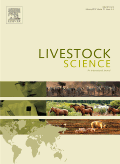
Livestock Science
Empowering the Livestock Community with Cutting-Edge ResearchLivestock Science is a prestigious academic journal published by ELSEVIER, dedicated to the comprehensive study of animal science and veterinary medicine. With an esteemed Q1 ranking in both the fields of Animal Science and Zoology, as well as Veterinary (miscellaneous) in 2023, this journal is recognized for its impactful contributions to the understanding of livestock health, production, and management. The journal has consistently earned its high position within Scopus, ranking 26th out of 194 in General Veterinary and 86th out of 490 in Animal Science and Zoology, reflecting its significant influence within the research community. The open access policy allows for broader dissemination of knowledge, promoting collaboration among researchers, professionals, and students alike. With its continuous publication cycle from 2006 to 2024, Livestock Science remains an essential resource for anyone interested in the advancements, challenges, and innovations within the field of livestock management and veterinary practices.

Brazilian Journal of Poultry Science
Fostering collaboration for a thriving poultry industry.Brazilian Journal of Poultry Science, an esteemed publication of FACTA-FUNDACIO ARNCO CIENCIA TECNOLOGIA AVICOLAS, serves as a pivotal resource for researchers and professionals in the field of poultry science. Since its inception in 2000, the journal has maintained a commitment to Open Access, ensuring that high-quality research is accessible to a global audience. Based in Brazil, the journal provides a platform for innovative studies and advancements in animal science and zoology, achieving a commendable Q3 category ranking in 2023 and occupying the 270th position in Agricultural and Biological Sciences according to Scopus metrics. With a focus on disseminating robust scientific findings, the journal enhances understanding of poultry production, welfare, and genetics, crucial for the increasingly essential food production sector. Published continuously from 2002 to 2024, it remains dedicated to fostering knowledge exchange, supporting academic growth, and addressing the challenges faced by the poultry industry.